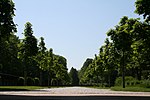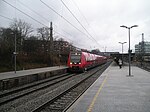Ryvangen Memorial Park (Danish: Mindelunden i Ryvangen) is a memorial park in Ryvangen officially inaugurated on 5 May 1950 to commemorate fallen members of the Danish resistance to the German occupation of Denmark during World War II.
The location in Ryvangen, which means "rye field", was acquired in 1893 by the army for a barracks and exercise field.On 29 August 1943, when the Danish cooperation with Germany broke down, the German occupying forces seized the army and naval facilities in all of Denmark including Ryvangen.While the German army used the barracks for themselves, part of the exercise field was used as an execution and burial site for members of the Danish resistance.The execution site consisted of three wooden poles to which the condemned were tied and executed by firing squad.
On 5 May 1945, in connection with the liberation, members of the resistance came to Ryvangen and only then did the public get confirmation that the executions of the German occupying forces had taken place there.The Comrades' Relief Fund writes that, on 5 May, members of the resistance discovered 202 graves in Ryvangen and that the minister for ecclesiastical affairs had the remains exhumed for identification.After the liberation the site was converted to a cemetery and memorial park for the resistance members who were executed there or were otherwise killed. In connection with the burials there, the site was referred to as Mindekirkegaarden i Ryvangen (Ryvangen Memorial Cemetery). The bereaved could choose to have the remains buried at the memorial park or at a cemetery closer to home.On 29 August 1945, two years after the German occupiers had dissolved the Danish army and navy, 106 hearses thus drove from the Christiansborg Riding Grounds through Copenhagen to the memorial park in Ryvangen with the flags in the city flying half-mast. Bishop Hans Fuglsang-Damgaard inaugurated the park as a cemetery with the Danish royal family, the government and representatives from the resistance movement present at the funerals.In the center of the grave field lies a memorial stone for the 91 resistance members who were exhumed in Ryvangen and buried in a cemetery closer to home.The remains of 31 resistance members who died in German prisons and concentration camps are also buried here. The pergola along the eastern border of the park has a memorial wall with 151 plaques, one for each of the 151 Danish resistance members whose remains have never been found.On 24 December 1949 the newly formed Home Guard held a memorial service for the victims of the occupation in the memorial park. Every Christmas Eve since then the Home Guard holds a memorial service there.









